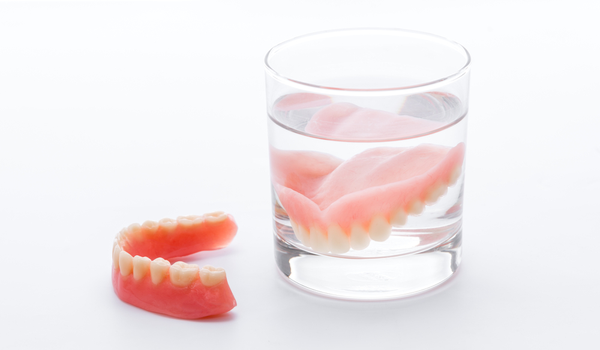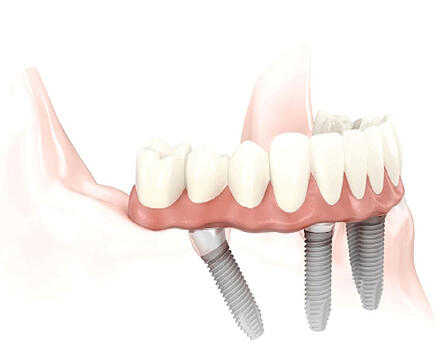
If you think back to your childhood, you might remember the set of prosthetic dentures, left suspended in a warm cup of water overnight at your grandparents' house. The idea of a whole new set of teeth that you could remove and replace from your mouth every day was commonplace for people who had suffered tooth loss and was the only real solution available.
Fast-forward a few decades, and modern oral surgery technology has afforded a whole new set of permanent solutions, known as dental implants. These implants are fixed in your mouth and eliminate some of the common problems experienced with traditional dentures. Not to mention, they look great too.
But what are the problems that modern oral technology has resolved, and how far have we come? In this blog, we dive into the world of traditional dentures, and uncover some of the ways in which oral surgeons have innovated - and the subsequent happy patients that have come of the industry's growth.
What are traditional dentures?

Traditional dentures are artificial teeth and gums that are moulded to the shape of your mouth, to replace natural teeth. These can be partial or full, replacing the specific amount of teeth you've lost.
The main point of difference for traditional dentures is that they're not permanently fixed. In fact, they're held in place by your gums and can be removed at any time, easily.
This may sound like a nice luxury to have, but if you ask any dentures-wearer, they'll tell you quickly that there are a few common problems associated with traditional dentures.
Common problems with traditional dentures
While traditional dentures were commonplace in oral care for a number of decades, the nature of their composition and placement meant many problems for patients, both short and long term.
- Because of the acrylic materials used to create traditional dentures, they must be kept moist regularly, otherwise, they become brittle and prone to breakage. This means taking your dentures out and leaving them to soak, every night.
- As a result of the moisture, traditional dentures house a number of bacteria that can lead to bad breath and other oral health issues.
- Because your dentures aren't fixed in your mouth and are supported by your gums, many patients complain that they're ill-fitting, uncomfortable, and cause difficulty when eating.
- Patients also tend to find that they're unable to taste their food very well, especially if they're fitted with a full traditional denture.
- Traditional dentures tend to put a lot of pressure of the gums and don't stimulate the jaw as natural teeth would, which can lead to irritation and a 'hollowed' look on the patient's face, long term.
What is modern dental implant treatment?

Fortunately, over the past few decades, the solutions available to patients who have experienced tooth loss have significantly advanced and implant treatment has become the preferred method.
Modern dental implant treatment is the process of creating a strong, and aesthetically pleasing, a new set of prosthetic teeth (bridges, a single tooth or full replacement), that's customised to the shape of the patient's mouth and teeth. These are then fitted to an implant, usually a titanium screw, that's embedded into your bone structure.
While there are a number of modern implant options, the best in its class of solutions, All-On-4 implant full-teeth replacement surgery, is typically the preferred procedure. This is when instead of implanting each individual tooth (which would be a fairly invasive procedure), the All-on-4 technique uses four, strategically placed implants per arch.
That means a full set of pearly whites, with a more cost-effective and less invasive surgery - a long shot from the traditional dentures you remember seeing in your grandparents' bathroom.
The benefits of modern All-on-4 implants
The benefits that modern All-on-4 implants can offer are significant. There's a reason it's the preferred treatment by patients and oral surgeons alike. Some of these include:
- Your implants are permanently fixed in your mouth and act as natural teeth would. That means no awkward placement, the jaw is stimulated naturally, there's no damage to adjacent teeth, and no need to risk bacterial infection and poor oral health due to 'soaking your teeth'.
- The procedure itself is short, between 90-minutes and two-hours long. In a single day, you can go from missing teeth to a full set of stunning prosthetics (a new set of teeth).
- Many patients feel that they don't want people to know that they have any 'false' teeth. As implants are fixed, you go to bed with your teeth, and you wake up with your teeth every day, meaning no one can tell if you have dentures or not.
- There's no need to add a special routine into your daily teeth cleaning or soak your teeth in a solution overnight. You can maintain your same routine as always, as implants function as normal teeth would.
How far has dental technology come?
The improvements in implant technology solutions over the past few decades have made teeth replacement a quick, easy, and natural feeling process for patients globally.
Long gone are the days when your only option was to replace a full set of teeth, with an ill-fitting denture that made simple functions such as eating a struggle.
If you'd like to find out more about the full range of dental implant options, and discover how they can best help you, get in touch with our friendly team today - they'd be more than happy to assist!